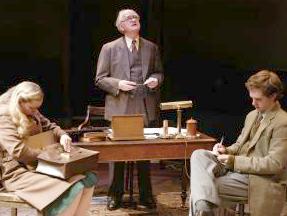SEARCH
REVIEWS
FEATURES
NEWS
Etcetera and
Short Term Listings
LISTINGS
Broadway
Off-Broadway
NYC Restaurants
BOOKS and CDs
OTHER PLACES
Berkshires
London
California
DC
Philadelphia
Elsewhere
QUOTES
On TKTS
PLAYWRIGHTS' ALBUMS
LETTERS TO EDITOR
FILM
LINKS
MISCELLANEOUS
Free Updates
Masthead
Writing for Us
A CurtainUp  London Review
London Review
 London Review
London ReviewThe Linden Tree
by John Thaxter
|
Sixty-five, you know. I ought to feel something special, and I've been trying all day and can't manage it. The last time I felt something quite definite was when I was forty-and I've never felt quite so old since
---- Professor Robert Linden |

Rachel Coffey as Edith Westmore,
Oliver Ford Davies as Professor Linden and Tom McDonald as Bernard Fawcett
(Photo: Robert Day) |
J B Priestley is now best known for An Inspector Calls. But the prolific novelist and playwright with a social conscience also had a West End hit in 1947 with The Linden Tree, which enjoyed a year's run at the Duchess Theatre starring the late, great Sybil Thorndike and her husband Lewis Casson. Framed by Priestley as a family reunion to celebrate Professor Linden's 65th birthday, it is also in some ways a state of the nation report on the privations and prospects of a country struggling to recover after the Second World War.
The Allies had won the war, but Britain soon discovered it had lost the peace. France with an infrastructure still largely intact could enjoy the fruits of the Liberation with Dior's New Look and abundant food and wine, while the Brits were to face nine more years of rationing, 'utility' clothes and furniture, power cuts and whisky for export only.
Yet despite the belt-tightening austerity, and thanks to a landslide Labour victory at the 1945 election, they were, as Linden tells us, "trying to do something extraordinary": a bloodless revolution that brought transport and industry into public ownership and a welfare state that included the National Health Service as one of its lasting achievements. Priestley brilliantly draws all these elements into his play as a backdrop to family conversations, needing no explanation for his contemporary audience. But the post-war events are now largely a closed book to the generations that followed, and it is thus no great surprise that this Orange Tree production is the very first London revival of the play.
Happily this much-loved theatre in Richmond, with its purpose built in-the-round auditorium, has a commitment to staging plays from our theatrical heritage that are not a current part of our national repertoire, which means that Priestley's 1940s time-capsule, a beautifully structured drama, is at last given fresh life and legs for a new appreciative audience of local theatregoers. One of the country's leading stage and screen directors, Christopher Morahan has assembled a hand-picked cast of players, directing with a skilful eye for pace and period detail, including social niceties and proper English accents free of 'estuary' influence, plus a rhythm and drive that holds our attention over the two hours and 40 minutes playing time.
A regular star of National Theatre and Orange Tree productions, Oliver Ford Davies plays Professor Linden, an Oxford historian who now occupies a Chair at a redbrick university in the North of England, but is on the cusp of being forced to retire by a pushy Vice Chancellor with a grossly utilitarian approach to education. This suits Linden's long-suffering wife (Anna Carteret). She's desperate to leave this gloomy Northern English town for a fuller life down South, prompted by the prospect of moving into a luxurious Hampshire manor house recently acquired by their son Rex (Roger Barclay), a young mover and shaker grown wealthy on dubious Stock Exchange deals.
Meanwhile, between visits by two scruffy young students (amusingly played by Tom McDonald and Rachel Coffey), the Lindens are entertaining their children for the weekend birthday celebration, an event that brings together the neurotic Jean (Elizabeth Marmur), a Marxist surgeon at a North London hospital, who works all hours, and Marion (Hannah Yelland) her chic younger sister, now a Catholic and living with her Gallic husband and children in France. Soon these two are renewing their old squabbles against the squalid background of England in a state of dishevelment and disrepair, in comparison with la belle France.
The family party is completed by Jennifer Higham who, despite an impressive list of National Theatre and screen appearances to her credit, is both delightful and wholly believable as the gauche young Dinah, an 18-year old who, inspired by the work of Pablo Casals, has serious ambitions to become a solo cellist. With Deddie Davies as a cockney housekeeper, a wartime fugitive from the London Blitz, and Ian East as the university secretary, the scene is thus set for a wide-ranging debate, much family fun, glum marital exchanges, and a resolution that will leave the family in a state of irretrievable disharmony.
But also in true Priestley style and without a shred of sentimentality-neither from the author, director nor actor-the play ends as Linden reaches for a pen, absorbed in the task of making some amendments to a book on history that until this moment had lain forgotten and unfinished in his desk drawer.
|
THE LINDEN TREE
Written by JB Priestley Directed by Christopher Morahan Starring: Oliver Ford Davies, Anna Carteret With: Roger Barclay, Rachel Coffey, Deddie Davies, Ian East, Jennifer Higham, Elizabeth Marmur, Tom McDonald and Hannah Yelland. Design: Tim Meacock Lighting: John Harris: An Orange Tree Theatre Production Running time: Two hours and 40 minutes including one interval Box Office: 020 8940 3633 Booking until 25th March 2006 Reviewed by John Thaxter based on 17th February 2006 performance at the Orange Tree Theatre, 1 Clarence Street, Richmond, Surrey, TW9 2SA (Rail/Tube: Richmond) |





